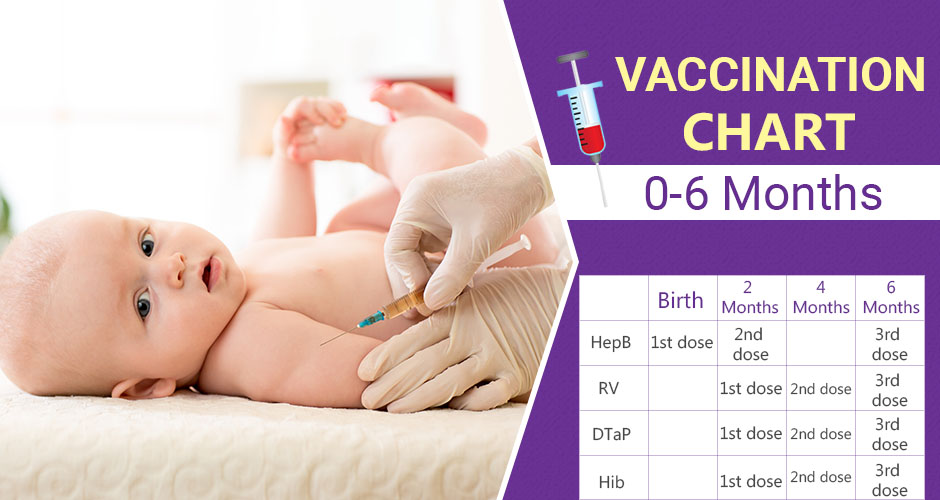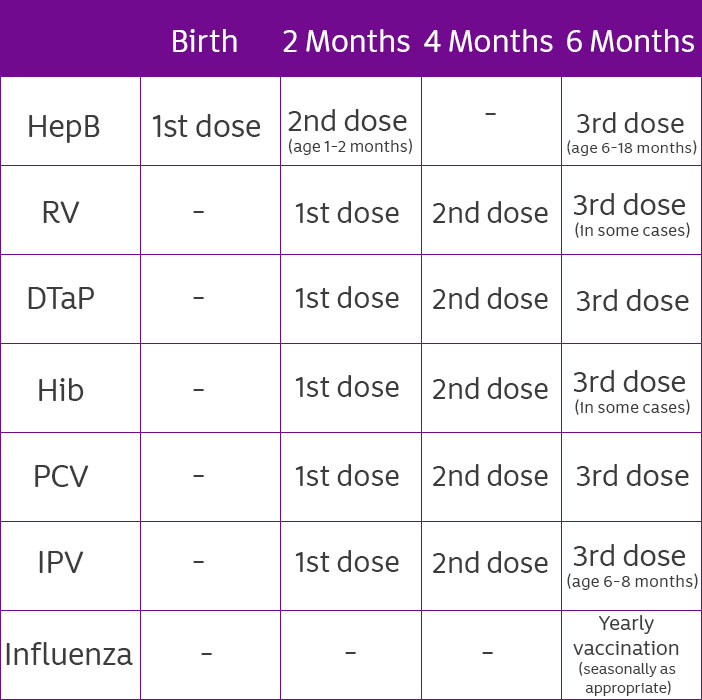
Essential Vaccination Chart For Babies In The First 6 Months
This information is brought to you by Prega News. No parent wants to see their baby in pain but there are a few times when they are left with no choice. One such moment is when the baby is being vaccinated. Read this article to find out why vaccination is important and also find the vaccination chart for babies (0-6 months).
What are vaccines?
Vaccines can be described as products which help in protecting people against serious and life-threatening diseases. Most medicines work by curing diseases while vaccines prevent them. Vaccines give immunity to a specific disease. Most vaccines are administered by an injection, while some are given orally or nasally. Vaccination or immunization is the act of introducing a vaccine into the body to produce immunity to a specific disease. It can also be called a process in which a person becomes protected against a disease. “Immunity simply means protection from a disease. If you are immune to a disease, you can be exposed to it without being sick”, (immunizebc.ca).
How do vaccinations work?
Simply put, vaccinations boost the immune system’s ability to fight certain infections. The vaccinations teach the child’s immune system to recognise a specific germ and then fight them. So, when the child is exposed to these germs, he is less prone to getting sick. Your child’s immune systems fights antigens (germs in in the vaccine) by making antibodies. Each antibody has a specific function to fight a specific germ. These antibodies also make memory cells to remember the germs incase of an encounter in the future.Essential Vaccination Chart for 0-6 Month Babies

Descriptions of vaccines
Please find a short description of the vaccines in the vaccination chart for babies (0-6 months).#1. Hep B
HepB is administered in three shots and the first shot is given at the time of birth. HepB protects against Hepatitis B (infection of the liver).#2. RV
This vaccine helps in protecting against rotavirus, which is a major cause of diarrhea. Depending on the vaccine used, RV is given in two or three doses.#3. DTaP
DTaP is used to protect against diphtheria (an infection of the nose and throat), tetanus and pertussis (whooping cough). Five doses are given during infancy and childhood. DTaP boosters are also given during adolescence and adulthood.#4. Hib
This vaccine protects against Haemophilus influenzae type b. This infection used to be a leading cause of bacterial meningitis. Hib vaccination is given in three or four doses.#5. PCV
PCV protects against pneumococcal disease, which also includes pneumonia. PCV is given in a series of four doses.#6. IPV
IPV protects against polio and is given in four doses.#7. Influenza
This vaccine is essential in protecting against the flu. This is a seasonal vaccine that is given yearly. Flu shots can be given to your child each year, starting at age 6 months.Why vaccination is important
According to an article published in www.businessworld.in, five lakh children die every year in India due to not being vaccinated. Parents should be made aware that getting their children vaccinated can save them and also stop diseases that are contagious. Please read these following points to understand why vaccination is important:- Diseases like measles, mumps and whooping cough are still considered to be a threat. Vaccinating your children will protect them from serious illnesses that are vaccine-preventable. This can include losing an arm or a leg, paralysis of the limbs, hearing loss and brain damage among others.
- Outbreaks of preventable diseases occur if the child is not vaccinated.
- Trusted organizations like American Academy of Pediatrics, the American Academy of Family Physicians and the Centers for Disease Control and Prevention strongly recommend vaccinations.
- Vaccines are considered to be of the easiest and safest preventive measures. Along with eating healthy and exercising, vaccines play a huge role in keeping you healthy.
- Please keep in mind that vaccination is safe and effective. All vaccines undergo long and careful review by scientists, doctors and the related government bodies to make sure that they are safe.
Things to remember during vaccination
- Stick to your child’s vaccination schedule and never miss a vaccine. If you do miss a vaccine, consult your paediatrician as soon as possible to figure out your next steps.
- Inform your paediatrician if your baby has a fever before vaccination.
- Your paediatrician may give you the option to choose a painful or painless vaccine for some doses. However, do not just assume that the painless vaccine is going to be completely painless. Talk to your doctor, understand the difference thoroughly and only then take a decision.
- Your baby may develop a slight fever after being vaccinated. You need not to worry too much as this is quite normal. You can give your baby a sponge bath to reduce your baby’s temperature. If the fever persists beyond two days, please consult a doctor.
- When taking your baby for vaccination, it is always helpful to have a second family member or friend around to hold the baby or keep him distracted.
null